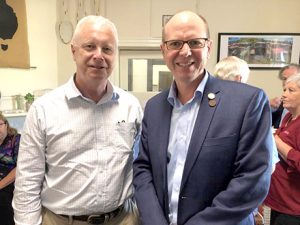Bushfire Royal Commission chairman, Retired Air Chief Marshall Mark Binskin, has extended his sympathy to the families of 33 people who died during Australia’s disastrous “Black Summer” and says the harrowing season will linger in the national psyche. Source: Timberbiz
The Royal Commission into National Natural Disaster Arrangements began its formal proceedings with a ceremonial hearing in Canberra yesterday. Due to social distancing requirements because of the CoVid-19 pandemic the hearing wasn’t open to the public but was live streamed.
Commissioner Binskin said the bushfires had deeply affected the lives of many Australians and “the harrowing experiences of this bushfire season will long linger in our national psyche”.
“The pervasive smoke haunting our towns and cities, the red skies turning black, the thunderous raw and thick smoke that accompanied the wall of flames and the utter devastation,” he said.
The Commission will examine the preparedness for, response to, and recovery from disasters including the recent bushfires, as well as floods, cyclones and earthquakes.
It will aim to hand down its findings before the start of the next bushfire season.
It will also examine legal issues around Commonwealth involvement in responding to national emergencies and its interaction with the states and territories, as well as the involvement of the Australian Defence Forces.
The Australian Forest Products Association used the occasion to reiterate its call for Australia’s forestry assets such as timber plantations to be considered critical infrastructure which must be a firefighting and mitigation priority.
“The Royal Commission provides the opportunity for Australians to find out why the 2019-20 Black Summer bushfires were so catastrophic, and what needs to be done to limit the impact of such events in the future,” acting Chief Executive Officer of AFPA Victor Violante said.
AFPA has also called on the Royal Commission to recognise the importance of Australia’s forestry assets such as timber plantations, timber-producing native forests, and processing facilities, as the recent fires highlighted the enormous economic impact on regional communities from the loss of such assets.
“While saving lives must be the priority for firefighting resources, we must also redefine critical infrastructure to include key economic assets such as timber plantations because they are the economic backbone of many regional communities, and they can take decades to recover. This should apply not just to the deployment of fire mitigation and suppression resources, but also recovery funding and timber salvaging operations,” Mr Violante said.
“In areas like the NSW Southwest Slopes, for example, where up to 40% of region’s softwood plantation estate was damaged by the fires the softwood plantation-based industry is the biggest employer in this region, supporting nearly $2 billion of annual economic activity in the region and employing around 5000 people. The loss of so much of the plantation estate will have significant impact on the industry and the region’s economy for at least the next 15 years, which is why it is imperative that every effort is made to prevent another fire like this.”
Mr Violante said the current CoViD-19 crisis highlighted that forest industries were essential not just for their economic contribution to the regions but also the essential products and services they delivered.
“It is more important than ever for Australia to have the resources and manufacturing capability for essential forest products such as toilet paper, packaging, and housing construction timber. They should be considered critical infrastructure for Australia,” he said.
AFPA is also urging the Royal Commission to examine the need for a whole-of-landscape approach to bushfire mitigation and land management.
“With the Royal Commission’s terms of reference including ‘the preparedness and resilience responsibilities, which includes land management and hazard reduction measures’, this is an opportunity to ensure Australia has a coordinated, whole-of-landscape approach to land management and more aggressive fuel reduction that includes mechanical fuel reduction alongside prescribed burns in the future.”
“Currently there are multiple approaches to fuel reduction by multiple land managers and agencies across different land tenures, and that hasn’t worked,” Mr Violante said.
“We need a whole-of-landscape approach which should include using mechanical fuel reduction techniques, which have proved highly effective in other bushfire prone countries.”








